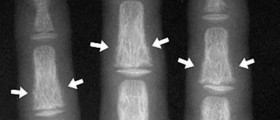Calcium is a mineral important for different body functions. Abnormal levels of calcium in blood can seriously affect health. Here we will discuss about importance of calcium and problems associated with high calcium levels.
The Role of Calcium in the Body
Calcium is required for bone formation, hormone release, muscle and heart functioning, functioning of the brain and spinal cord, strengthening teeth and blood clothing. Its levels are regulated in the body by the parathyroid hormone, vitamin D and calcitonin.
People mainly obtain calcium from food. The best sources of calcium are dairy products like milk, butter and cheese. Eggs, green vegetables such as broccoli, spinach and beans, nuts and whole grain foods like bread, rice and cereals are also rich in calcium.
Calcium is absorbed by the body through the inner lining of the bowel and then stored in the bones. Levels of calcium in blood are managed carefully. If the body does not receive enough calcium, the bones start releasing calcium in the blood. At the same time, absorption of calcium by the bowel increases while elimination of calcium by the kidney via urine decreases. On the other hand, if there is high level of calcium in blood, the mineral is less absorbed and more expelled by the body.

What is Hypercalcemia?
Excess calcium in blood causes disorder known as hypercalcemia. Hypercalcemia can occur due to increased intake of calcium through food, too much calcium leaking out of the bones into blood or kidneys failing to get rid of excess calcium.
Hypercalcemia is a common symptom of cancer. About 10-20% of cancer patients develop it. Hypercalcemia usually accompanies later stages of cancer although it may occur earlier.
- Many organs are involved in the regulation of calcium. Chief among these are the parathyroid glands and, when calcium levels drop, the parathyroid glands increase secretion of parathyroid hormone.
- Vitamin D, which is partially regulated through parathyroid hormone, also plays an important role in the regulation of calcium.
- In the healthy adult, the net daily calcium balance is zero. The majority of calcium is stored in the bone. The bone stores approximately 1000 g of calcium, and about 280 mg of this is turned over each day. Another 1000 mg is in circulation in the extracellular fluid. The average adult consumes approximately 1000 mg of calcium in their diet, of which 500 mg is absorbed, and the intestines secrete 325 mg, leading to a net absorption of 175 mg daily, and the rest is excreted in the feces.
- Hypercalcemia has many clinical manifestations, which are mostly independent of etiology and affect multiple organ systems. In the kidney, hypercalcemia can lead to nephrolithiasis, which may be silent or symptomatic. Chronic renal insufficiency may occur. Polyuria is also common and, combined with decreased oral intake, can lead to hypovolemia. Gastrointestinal manifestations include nausea, vomiting, and constipation and may be attributable to calcium's influence on smooth muscle. Pancreatitis may also occur, although the mechanism for this is unknown.
- Patients with cancer who have hypercalcemia can be divided into 2 major groups: those with and those without an elevated parathyroid hormone level. The most common cause of inappropriately elevated parathyroid hormone in all patients is primary hyperparathyroidism. In developed countries, it usually presents incidentally with an indolent course and is most often discovered from a screening serum calcium level obtained for other reasons.
There are several types of cancer that commonly lead to hypercalcemia and they include multiple myeloma, breast cancer, kidney cancer, prostate cancer, head and neck cancer and squamous cell cancer. Dehydration due to diarrhea can also lead to hypercalcemia.
Hypercalcemia Symptoms
Hypercalcemia may cause non-specific symptoms. That is why it is often overlooked. Severity of the symptoms does not reflect the levels of calcium in blood and only slightly elevated levels of calcium can produce very severe symptoms while abnormally high calcium level may manifest in mild form of the disease.
Common signs and symptoms of hypercalcemia are fatigue, lethargy, weakness, constipation, poor concentration and mild confusion. Difficulty walking, talking and eating, personality changes and hallucinations may be also present.
If left untreated, hypercalcemia can lead to drowsiness, frequent urination, increased thirst, dehydration, muscle twitches, tremor, bone pain, coma and death.

















Your thoughts on this
Loading...